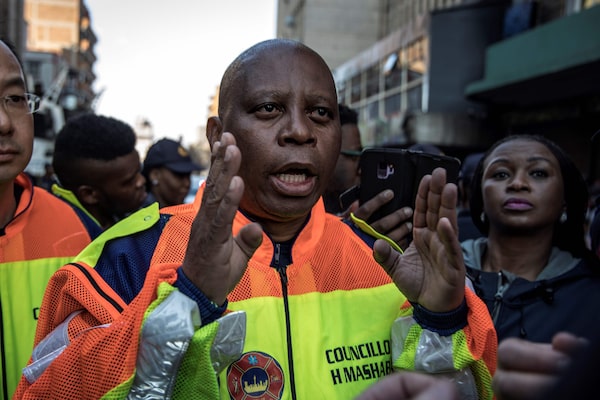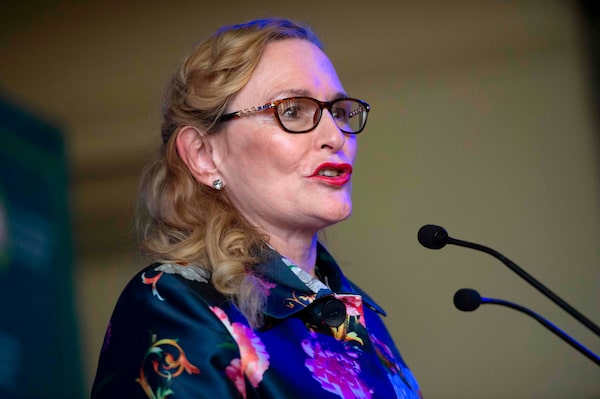
Johannesburg Mayor Herman Mashaba gestures as he meets with local councillors and law enforcement commanders, on Aug. 2, 2019.MARCO LONGARI/AFP/Getty Images
Factional feuding in South Africa’s largest opposition party has triggered the resignation of one of its top leaders, Johannesburg Mayor Herman Mashaba, in a fresh blow to its ambitions of challenging the long-ruling African National Congress for control of the country.
Mr. Mashaba had been a symbol of the rapid growth of the liberal Democratic Alliance when it won control of South Africa’s biggest city and economic hub in 2016. But his resignation on Monday is a symptom of internal splits that could tear the party apart.
The DA had lost ground in a national election earlier this year, despite a decline in ANC support, and the party has responded by announcing a review of its policies and leadership. On the weekend, its top officials voted to bring back a controversial former leader, Helen Zille, in its second-highest internal position. It was a signal of discontent with its current leader, Mmusi Maimane, the first black leader in the party’s history.
In another explicit sign of internal tensions in the party, Mr. Maimane attended Mr. Mashaba’s resignation speech on Monday, praising the mayor and hugging him, even after Mr. Mashaba had sharply criticized Ms. Zille and those who supported her.
The mayor’s resignation deprives the DA of one of its most popular leaders, a charismatic entrepreneur who was often seen as a candidate to become its national leader. It also increases the risk that the DA will lose control of Johannesburg, its biggest prize in the last municipal elections.

Mmusi Maimane, leader of the largest opposition party, the Democratic Alliance, is the party's first black leader.Jerome Delay/The Associated Press
The DA, traditionally the most popular party among South Africa’s white voters, has become increasingly divided over whether to support affirmative-action policies for black people. Leaders such as Ms. Zille have complained of what they call “racial quotas.”
In his resignation speech, Mr. Mashaba criticized the racial policies of Ms. Zille and others who seem to now have growing influence over the party.
“I cannot reconcile myself with a group of people who believe that race is irrelevant in the discussion of inequality and poverty in South Africa in 2019,” Mr. Mashaba said.
“I cannot reconcile myself with people who do not see that South Africa is more unequal today than it was in 1994,” he said, referring to the year when apartheid ended.
“The election of Helen Zille as Chairperson of Federal Council represents a victory for people in the DA who stand diametrically opposed to my beliefs and value system, and I believe those of most South Africans of all backgrounds.”

DA top officials voted to bring back a controversial former leader, Helen Zille, in its second-highest internal position. In this file photo from 2018, Zille speaks at the City Hall in Cape Town.RODGER BOSCH/Getty Images
He complained that some DA officials wanted him to give priority to cutting grass for “suburban residents” – a reference to the white voters who have always been the DA’s base – instead of focusing more on fixing broken infrastructure and “providing dignity to those forgotten people who remain without basic services 25 years after the end of apartheid.”
But while he cited racial issues in his resignation speech, Mr. Mashaba may have also been motivated by other factors, including the looming threat that he could soon lose the mayor’s job anyway.
Because it won just 38 per cent of the Johannesburg vote in the 2016 election, the DA could only win power by forming an unofficial coalition with another opposition party, the radical left-wing Economic Freedom Fighters. But in an internal report on the weekend, the DA expressed unhappiness with this arrangement, which gave influence to its ideological opponents.
The ANC, meanwhile, has been manoeuvring to regain power in Johannesburg by forging deals with the EFF and other opposition parties. Within weeks, it was expected to trigger a vote that could have unseated Mr. Mashaba and the DA.
Some DA officials have questioned Mr. Mashaba’s official reasons for resigning, suggesting he was more ideologically conservative and pro-market than the party itself and that his criticism of the party’s racial policies was a cloak to conceal other factors.
But there is no doubt that his resignation, combined with Ms. Zille’s elevation to a senior post, will provoke turmoil in the party. Ms. Zille, the party’s leader until 2015, has sparked outrage across South Africa with a series of racial comments. She complained of “black privilege” in South Africa, and she insisted that the legacy of colonialism was partially positive.
The DA launched an investigation into Ms. Zille’s colonialism comments in 2017, requiring her to apologize and to step down from party leadership positions. But on the weekend, she said she had never said she would not return. She acknowledged that the colonialism comments had damaged the party, but she complained that the comments were misunderstood.
Mr. Mashaba, a successful entrepreneur and former chairman of a free-market lobby group, was a star candidate for the DA when he was recruited to run in the 2016 election. But he was also controversial for blaming “foreign nationals” for many of the city’s problems, and for forging close links with the EFF party, despite corruption scandals involving EFF officials in the city.
The DA, meanwhile, is searching for solutions to its declining popularity. It had climbed to an all-time peak in voter support in 2016, partly because of a backlash against then-president Jacob Zuma. But when Mr. Zuma was replaced by Cyril Ramaphosa last year, the DA seemed to lose its main selling point. It sought to expand its reach to black voters, but this seemed to alienate some of its white voters, who switched to smaller parties in this year’s election.
Our Morning Update and Evening Update newsletters are written by Globe editors, giving you a concise summary of the day’s most important headlines. Sign up today.
 Geoffrey York
Geoffrey York